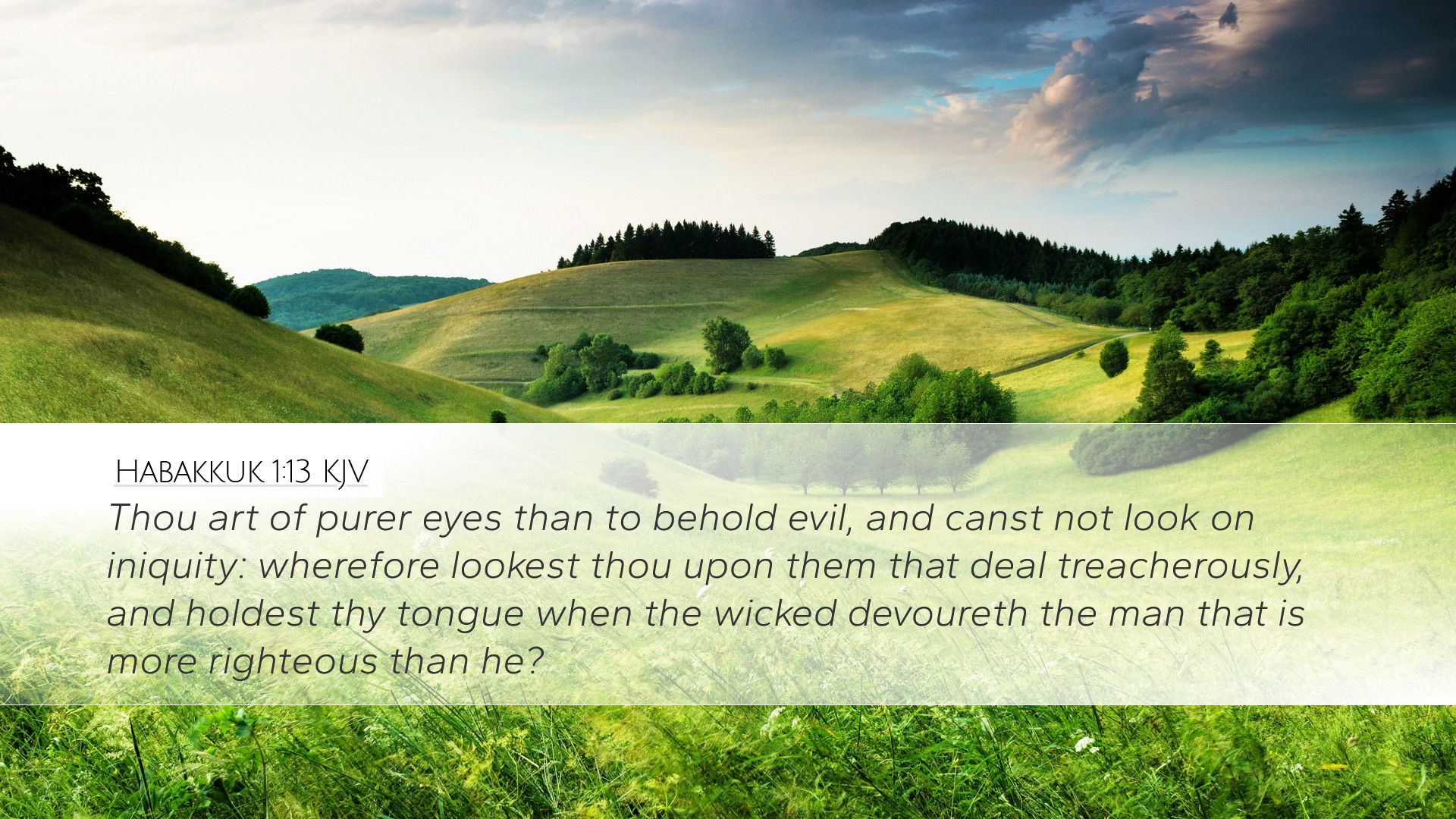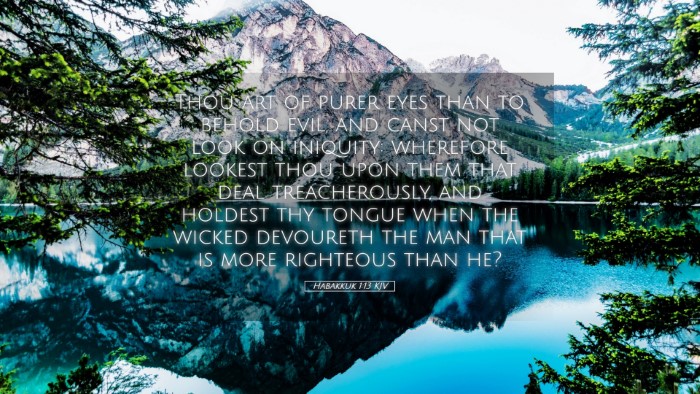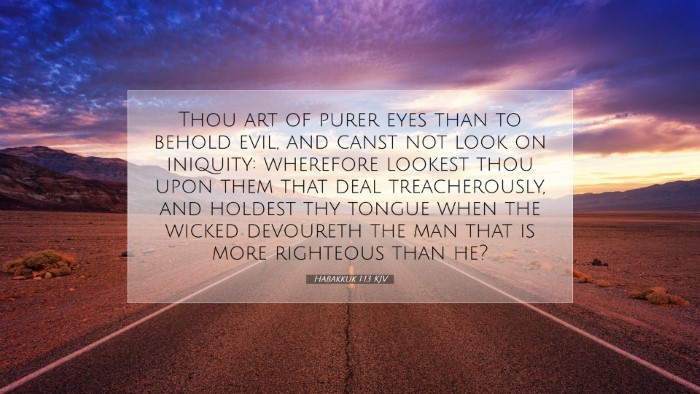Old Testament
Genesis Exodus Leviticus Numbers Deuteronomy Joshua Judges Ruth 1 Samuel 2 Samuel 1 Kings 2 Kings 1 Chronicles 2 Chronicles Ezra Nehemiah Esther Job Psalms Proverbs Ecclesiastes Song of Solomon Isaiah Jeremiah Lamentations Ezekiel Daniel Hosea Joel Amos Obadiah Jonah Micah Nahum Habakkuk Zephaniah Haggai Zechariah MalachiHabakkuk 1:13
Habakkuk 1:13 KJV
Thou art of purer eyes than to behold evil, and canst not look on iniquity: wherefore lookest thou upon them that deal treacherously, and holdest thy tongue when the wicked devoureth the man that is more righteous than he?
Habakkuk 1:13 Bible Commentary
Commentary on Habakkuk 1:13
Verse Context: "Thou art of purer eyes than to behold evil, and canst not look on iniquity: wherefore lookest thou upon them that deal treacherously, and holdest thy tongue when the wicked devoureth the man that is more righteous than he?" (Habakkuk 1:13, KJV)
Introduction
This verse stands as a poignant expression of the prophet Habakkuk’s struggle with the visible prosperity of the wicked alongside the suffering of the righteous. It reflects deep theological inquiries surrounding God’s holiness and justice, particularly in epochs of perceived divine silence and inaction.
Summary of Key Commentaries
-
Matthew Henry
Henry emphasizes the nature of God's purity and justice. He explains that God is too holy to look upon evil without disgust. His commentary highlights that the apparent impunity of the wicked poses a question of God's governance. Henry articulates that Habakkuk’s lament is not merely a physical observation, but a spiritual anguish that reflects a struggle to reconcile divine holiness with human experience.
-
Albert Barnes
Barnes appreciates the rhetorical nature of Habakkuk’s question. He interprets the prophet's sorrowful query as an acknowledgment of God’s unchanging nature, indicating that while humans may fail to see justice served immediately, God’s ultimate plan encompasses all. Barnes elucidates that the perceived delay in divine action does not equate to God's indifference, pushing believers to maintain faith despite circumstances.
-
Adam Clarke
Clarke delves into the implications of humanity's sinfulness in the context of divine observation. He notes that Habakkuk’s words uncover a vital theological principle: God’s inability to condone sin stems from His perfect nature. Clarke reinforces the idea that the suffering of the righteous serves a purpose within God’s grand narrative, aiming to strengthen faith and reliance on divine wisdom through trials and tribulations.
Theological Insights
The commentary on this verse raises several theological considerations:
- The Holiness of God: The verse underscores the essential attribute of God’s holiness. As pointed out by the commentators, God's purity is incompatible with evil, which raises questions about His interaction with a world filled with sin.
- The Problem of Evil: Habakkuk’s frustration concerns the coexistence of injustice and divine silence. The narrative illustrates a classic theological dilemma—if God is sovereign and good, why does He not intervene against evil? This continues to be a relevant discussion point in theodicy.
- Human Righteousness vs. Divine Justice: The verse highlights the tension between human observations of justice, characterized by suffering, and the divine perspective that encompasses eternity. The commentators agree that God’s ways are inherently higher than human understanding, urging a response of faith in the face of doubt.
Pastoral Applications
For pastors and church leaders, Habakkuk 1:13 serves as a fertile ground for encouraging congregations during times of despair:
- Affirming God’s Purity: Preaching on God’s unyielding holiness can help congregations appreciate the seriousness with which God regards sin, encouraging personal and communal repentance.
- Strengthening Faith in Despair: Pastoral care can be directed towards reassuring believers that God's justice may not be immediate but is certain, encouraging patience and trust in God’s timing.
- Fostering Community Prayer: Habakkuk’s cries to God exemplify the importance of communal lament and supplication, reminding congregations that they can approach God with their doubts and concerns.
Conclusion
Habakkuk 1:13 is an invitation to wrestle with the complexities of faith in the presence of evil and suffering. The insights derived from historic commentaries encourage a view of God that honors His holiness while also acknowledging human pain and injustice. For theologians and scholars, this verse remains a critical conversation starter regarding the interplay of divine attributes, providence, and human experience.


